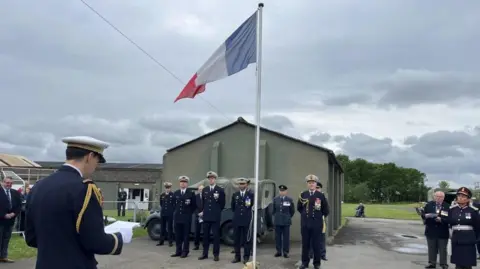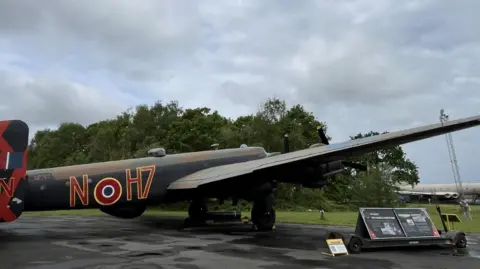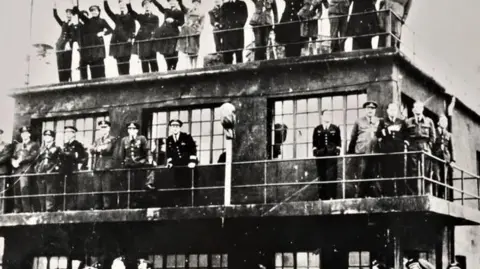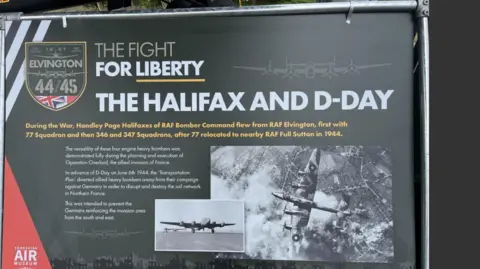French flag raised in tribute at Yorkshire Air Museum
 BBC/Olivia Richwald
BBC/Olivia RichwaldThe Yorkshire Air Museum has marked the 80th anniversary of two French bomber squadrons who were stationed at RAF Elvington for almost two years in 1944.
During World War Two, the museum site, near York, was an RAF base staffed entirely by foreign personnel.
The two French squadrons, No 346 (Guyenne) and No 347 (Tunisie), played a major part in the bombing offensive against Germany.
On Thursday, the French flag was raised at the former airbase to honour the 2,500 French aircrew who had been stationed there.
 BBC/Olivia Richwald
BBC/Olivia RichwaldThe French crews arrived at Elvington in May 1944.
Weeks later, on the eve of the D-Day landings, they were in action - flying Halifax bombers for a strike on a German gun battery at Grandcamp Maisy in Normandy.
The landings, on 6 June, marked the start of the campaign to free north-west Europe from the Nazis.
During the 18-month period when the French aircrews were stationed at Elvington almost half the crew members were killed in action.
 Yorkshire Air Museum
Yorkshire Air MuseumAir Commodore Adam Samson, RAF Air Officer North England, said the flag-raising ceremony was "a great meeting to commemorate the sacrifices made by French airmen during the war".
"I've got children who are older than many of the young men who died, and it really brings it home how young many of them were," he said.
More than 700 men were killed or became prisoners of war during the 4,000 sorties made from RAF Elvington.
Alain Mallia, from the Association de Groupe Lourds, is the son of one of the airmen who flew from the base.
Speaking after the ceremony, he said remembering the bravery shown by so many people had been "very important".
"What they are doing at the museum is very nice for the veterans," adding: "There are only two left now - that we know about, anyway."
 BBC/Olivia Richwald
BBC/Olivia RichwaldThe ceremony was also attended by Sebastien Bidaud, Deputy Head of Mission at the French embassy.
"We're talking about very impressive, but also very sad, events from 80 years ago," he said.
Mr Bidaud said it had been "a pleasure and an honour" to represent the French ambassador, describing the event as "beautiful and deeply moving".
Jerry Ibbotson, from the Yorkshire Air Museum, said the "unique and special" French crews had flown "mission after mission, bombing targets in Europe - including hitting their own country".
He went on to explain how the local area had become known as "la petite France" during the French aircrew's time at the base.
"The French crews were really taken into people's hearts here in Yorkshire," he said.
